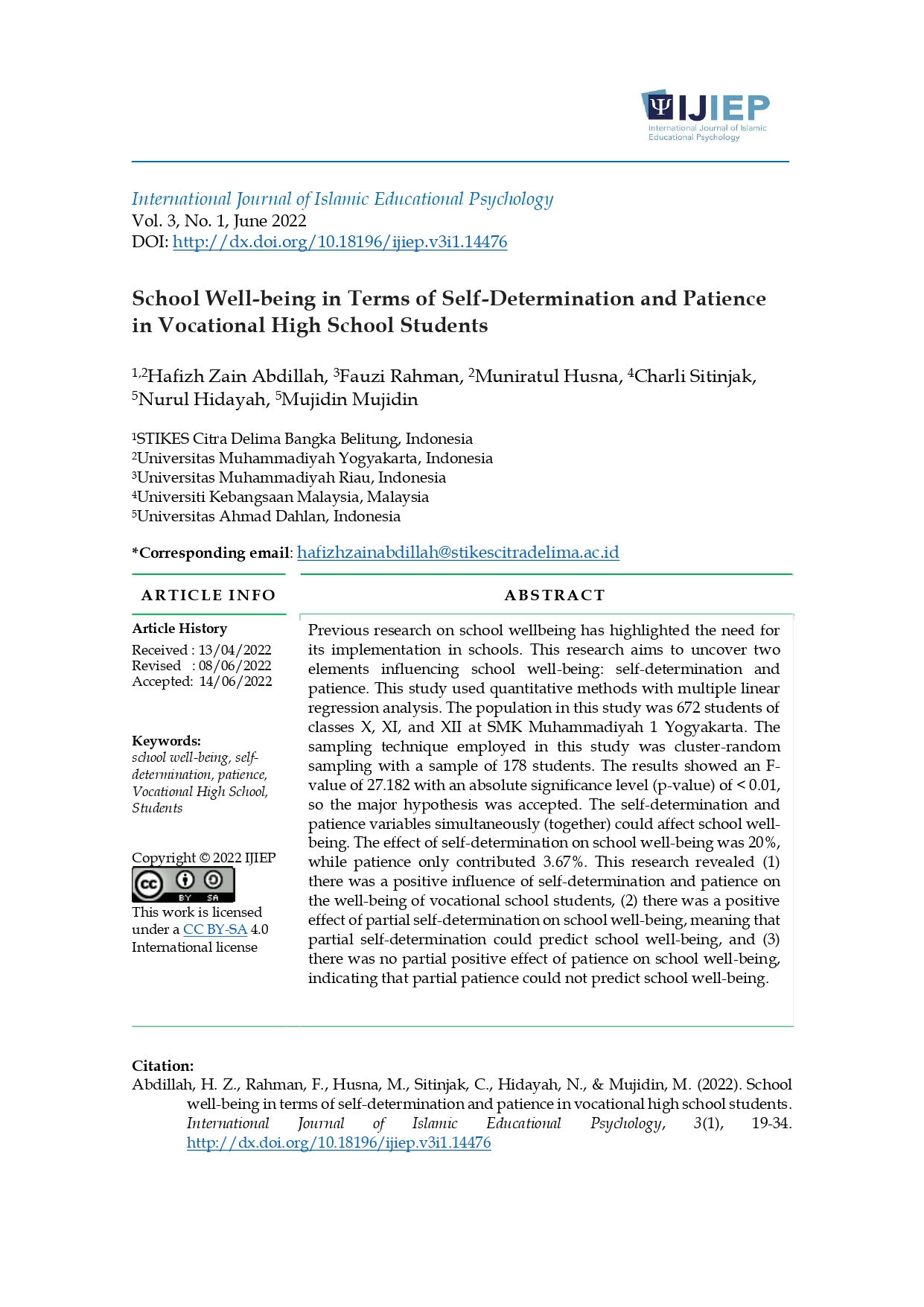School Well-being in Terms of Self-Determination and Patience in Vocational High School Students
DOI:
https://doi.org/10.18196/ijiep.v3i1.14476Keywords:
school well-being, self-determination, patience, Vocational High School, StudentsAbstract
Previous research on school wellbeing has highlighted the need for its implementation in schools. This research aims to uncover two elements influencing school well-being: self-determination and patience. This study used quantitative methods with multiple linear regression analysis. The population in this study was 672 students of classes X, XI, and XII at SMK Muhammadiyah 1 Yogyakarta. The sampling technique employed in this study was cluster-random sampling with a sample of 178 students. The results showed an F-value of 27.182 with an absolute significance level (p-value) of < 0.01, so the major hypothesis was accepted. The self-determination and patience variables simultaneously (together) could affect school well-being. The effect of self-determination on school well-being was 20%, while patience only contributed 3.67%. This research revealed (1) there was a positive influence of self-determination and patience on the well-being of vocational school students, (2) there was a positive effect of partial self-determination on school well-being, meaning that partial self-determination could predict school well-being, and (3) there was no partial positive effect of patience on school well-being, indicating that partial patience could not predict school well-being.References
Adams, N., Little, T. D., Ryan, R. M. (2017). Self-Determination Theory. In: Wehmeyer, M., Shogren, K., Little, T., Lopez, S. (eds) Development of Self-Determination Through the Life-Course. Springer, Dordrecht (pp. 47-54). https://doi.org/10.1007/978-94-024-1042-6_4
Baard, P. P., Deci, E. L., & Ryan, R. M. (2004). Intrinsic need satisfaction: A motivational basis of performance and well-being in two work settings. Journal of Applied Social Psychology, 34(10), 2045–2068. https://doi.org/10.1111/j.1559-1816.2004.tb02690.x
Deci, E. L., & Ryan, R. M. (2008). Self-determination theory: A macrotheory of human motivation, development, and health. Canadian Psychology, 49(3), 182–185. https://doi.org/10.1037/a0012801
El Hafiz, S., Rozi, F., Mundzir, I., & Pratiwi, L. (2013). Konstruk psikologi kesabaran dan perannya dalam kebahagiaan seseorang. Laporan Penelitian: Lembaga Penelitian Universitas Hamka. https://doi.org/10.13140/RG.2.2.11259.36649
Geon, S. A. B. (2016). Hubungan antara efikasi diri dan determinasi diri siswa kelas x SMA Charitas. Jurnal Psiko-Edukasi, 14(1), 28–38. Retrieved from http://ojs.atmajaya.ac.id/index.php/fkip/article/view/545/426
Ghozali, I. (2009). Aplikasi analisis multivariate dengan program SPSS, Semarang. Badan Penerbit Universitas Diponegoro, Semarang.
Khormaei, F., Farmani, A., & Yazdani, F. (2017). Predicting self-control on the basis of patience and its components among high school students. Practice in Clinical Psychology, 5(1), 11–16. https://doi.org/10.18869/acadpub.jpcp.5.1.11
Konu, A., & Lintonen, T. (2006). Theory-based survey analysis of well-being in secondary schools in Finland. Health Promotion International, 21(1), 27–36. https://doi.org/10.1093/heapro/dai028
Konu, A., & Rimpelä, M. (2002). Well-being in schools: A conceptual model. Health Promotion International, 17(1), 79–87. https://doi.org/10.1093/heapro/17.1.79
Levesque, C., Copeland, K. J., Pattie, M. D., & Deci, E. L. (2010). Intrinsic and extrinsic motivation. International Encyclopedia of Education, 618–623. https://doi.org/10.1016/B978-0-08-044894-7.00612-6
Mamahit, H. C. (2014). Hubungan antara determinasi diri dan kemampuan pengambilan keputusan karir siswa SMA. Journal Psiko-Edukasi, 12(2), 90-100.
Niemiec, C. P., & Ryan, R. M. (2009). Autonomy, competence, and relatedness in the classroom: Applying self-determination theory to educational practice. Theory and Research in Education, 7(2), 133–144. https://doi.org/10.1177/1477878509104318
Paramitha, A., Luawo, M. I. R., & Tjalla, A. (2014). Hubungan antara determinasi diri dengan nilai hasil belajar siswa kelas XI SMAN 53 Jakarta. Insight: Jurnal Bimbingan Konseling, 3(1), 29–34. https://doi.org/10.21009/INSIGHT.031.05
Ramdani, Z., Supriyatin, T., & Susanti, S. (2018). Perumusan dan pengujian instrumen alat ukur kesabaran sebagai bentuk coping strategy. Jurnal Psikologi Islam dan Budaya, 1(2), 97–106. https://doi.org/10.15575/jpib.v1i2.2955
Ryan, R. M., & Deci, E. L. (2000). Self-determination theory and the facilitation of intrinsic motivation, social development, and well-being. American Psychologist, 55(1), 68–78. https://doi.org/10.1037/0003-066X.55.1.68
Ryan, R. M., Sheldon, K. M., Kasser, T., & Deci, E. L. (1996). All goals are not created equal: An organismic perspective on the nature of goals and their regulation. In P. M. Gollwitzer & J. A. Bargh (Eds.), The psychology of action: Linking cognition and motivation to behavior (pp. 7–26). The Guilford Press.
Schnitker, S. A., & Emmons, R. A. (2007). Patience as a virtue: Religious and psychological perspectives. Research in the Social Scientific Study of Religion, 18, 177–207. https://doi.org/10.1163/ej.9789004158511.i-301.69
Schutz, P. A., Quijada, P. D., De Vries, S., & Lynde, M. (2010). Emotion in educational contexts. In International Encyclopedia of Education (pp. 591–596). Elsevier. https://doi.org/10.1016/B978-0-08-044894-7.00605-9
Sheldon, K. M., Ryan, R., & Reis, H. T. (1996). What makes for a good day? Competence and autonomy in the day and in the person. Personality and Social Psychology Bulletin, 22(12), 1270–1279. https://doi.org/10.1177%2F01461672962212007
Subandi, P. (2011). Sabar: Sebuah konsep psikologi. Jurnal Psikologi UGM, 38(2), 215-227. https://doi.org/10.22146/jpsi.7654
Sukmadinata, N. S. (2004). Landasan psikologi proses pendidikan. PT. Remaja Rosda Karya.
World Health Organization. (1998). WHO’s global school health initiative: Health promoting schools. In World Health Organization, Geneva, Switzerland (pp. 243–256).

Downloads
Published
How to Cite
Issue
Section
License

- Share — copy and redistribute the material in any medium or format
- Adapt—remix, transform, and build upon the material for any purpose, even commercially.
The licensor cannot revoke these freedoms as long as you follow the license terms. Under the following terms:
- Attribution: You must give appropriate credit, provide a link to the license, and indicate if changes were made. You may do so in any reasonable manner, but not in any way that suggests the licensor endorses you or your use.
- ShareAlike: If you remix, transform, or build upon the material, you must distribute your contributions under the same license as the original.
- No additional restrictions — You may not apply legal terms or technological measures that legally restrict others from doing anything the license permits.






